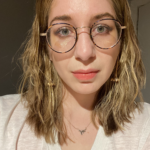Kat Von D has left the beauty world after divesting from her brand, KVD Vegan Beauty, FKA Kat Von D Beauty (yes, it's exhausting, I know). But she still has thoughts on the state of beauty in 2020 and has plenty of criticism reserved for — yep — influencers. Here's what she said and why I disagree with her statements.
Von D appeared on a podcast called Second Life.
Paper Mag reports that Von D chatted with the Second Life podcast to explain her decision, among other things, to leave her brand. "It's been 11 years, and I am proud of what we've done, but I think that the beauty industry is changing so much," Von D told host Hillary Kerr. "For a moment there, I felt like I did find my place in an industry, and then I think the older I get, I realize that I don't know if I fit into it anymore."
Von D goes on to say that, from the outset, her brand's intention was to be a "platform for us outsiders," and "not fitting into what's expected, the societal ideals of what beauty is."
She then discusses beauty influencers.
"…We have influencers that are just continuously telling you that you have to buy, and if you don't, you're not cool," she continued, calling it part of today's beauty "culture." And Von D feels that influencers are pushing a standard of what "beauty looks like."
"It kind of throws me back to how I felt when I was a kid," she said, which any punk, goth, or weirdo kid can totally understand, citing that alienation as the reason she "stepped away from it a lot, partially on purpose."
Let's critically analyze these statements.
If Von D's statement seem rich, I'd argue that's because they are. Von D may not have been a beauty influencer in the traditional sense, but in making herself the face of her own brand, she became an influencer in most of the ways that matter.
Exhibit A: her wedding.
Her wedding was the Most. And that's fine! Von D is allowed to have a lavish goth wedding and share it all over her social media, but just so we're clear, the level of art direction involved — including instituting an all-black dress code for guests — is all about making it look good on the 'gram. Which again, is fine!
Exhibit B: She shared gifted items to her 7.3m followers.
Von D was apparently gifted this shirt, writing, "Thank you @MisterRyanAdams, for my favourite Judas Priest shirt of all time." This is also totally fine! But it's not accurate to suggest that she existed outside of the influencer world when she was doing all of the things that influencers do on social media.
Exhibit C: The Kat Von D Beauty Artistry Collective.
In 2017, her brand announced the creation of the Kat Von D Beauty Artistry Collective: four makeup artists who were Instagram-based beauty influencers in their own right. The collective initially consisted of Stephanie Strazzere, Leah Carmichael, Kelseyanna Fitzpatrick, and Tara Buenrostro. Fitzpatrick has since left the group.
These women are all supremely talented and creative and had large followings prior to their work in the collective. In the Artistry Collective, they swatched products that were used on the brand's social media and website, collaborated on product launches, and created beauty looks for large-scale campaigns. They also primarily used and promoted Kat Von D Beauty products on their Instagram pages.
I repeat myself, all this is fine!
Really, it's FINE.
Pointing out these actions from Von D and her brand are not a criticism. There is nothing wrong with her wedding, her social media posts, and the Artistry Collective.
Rather, I'm arguing that it is disingenuous of her to position herself as beyond beauty influencer "culture" when she was just as much an active participant in it. Von D herself created an idea of beauty ultimately centered around the promotion of her beauty products. That is literally what a beauty influencer does for a living — except most of them didn't have a product line at Sephora.
She also suggested that beauty isn't a place for "outsiders" anymore.
Here's where I take the most umbrage with her statements. In stating that she, as an outsider, feels alienated by beauty today, suggests that she feels that the beauty industry has become more hostile towards those who express themselves outside any standards.
There is a very real conversation to be had about homogeneity in beauty standards, or the so-called "Instagram face." We should talk about the toll it can take on mental health seeing impossible, unrealistic, and straight-up false beauty imagery, especially among young people. It's why Instagram has begun hiding plastic surgery content for users under 18.
But Von D has it wrong. We are living in such a rich time for outsider beauty expressions. LGBTQ+ models like Teddy Quinlivan are now the faces of mainstream beauty campaigns, brands like Fenty Beauty have championed inclusivity, and influencers like MannyMUA are giving visibility to makeup being worn alongside traditional markers of masculinity, like facial hair.
There are Instagram makeup artists that don't hide their acne. Artists who create mind-melting makeup looks that questions our ideas of beauty, and bizarre beauty trends that are weird, fun, and fascinating. Hijabi makeup artists. Makeup artists with disabilities and facial disfigurements.
Von D's comments are flat-out wrong. There has never been a better and more accepting time to be obsessed with beauty. Yes, there is so much work to be done, but her sentiments are not indicative of the beauty world as a whole.




